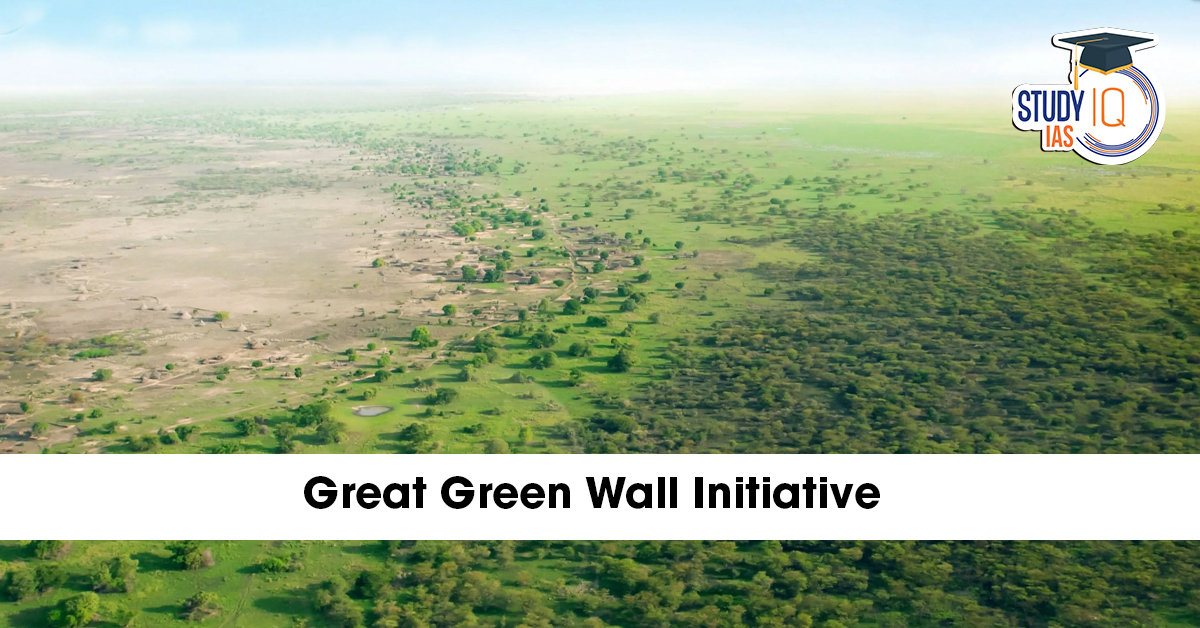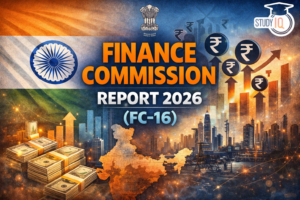Table of Contents
Despite its ambitious objectives, the Great Green Wall Initiative (GGWI) continues to face major implementation challenges across Africa.
The project, launched to combat desertification and land degradation in the Sahel region, has shown progress in certain areas, but funding gaps, political instability, and climate stress are slowing its overall success.
What is the Great Green Wall Initiative (GGWI)?
The Great Green Wall Initiative is an African-led global movement launched in 2007 by the African Union (AU).
Main Goal:
To restore degraded land, combat desertification, and build climate resilience across the Sahel region — the semi-arid zone stretching south of the Sahara Desert.
Geographical Extent
-
The Great Green Wall spans 11 African countries, from Senegal (West Africa) to Djibouti (East Africa).
-
The initiative aims to create a mosaic of green and productive landscapes across nearly 8,000 km of the Sahel.
Participating Countries:
🇸🇳 Senegal | 🇲🇱 Mali | 🇧🇫 Burkina Faso | 🇳🇪 Niger | 🇳🇬 Nigeria | 🇨🇲 Cameroon | 🇨🇫 Central African Republic | 🇸🇩 Sudan | 🇪🇹 Ethiopia | 🇪🇷 Eritrea | 🇩🇯 Djibouti
Objectives of the Great Green Wall
| Objective | Target |
|---|---|
| Restore degraded land | 100 million hectares by 2030 |
| Sequester carbon dioxide | 250 million tonnes (CO₂) |
| Create green jobs | 10 million jobs for local communities |
| Enhance food security | Increase agricultural productivity in arid regions |
| Reduce poverty & migration | Improve rural livelihoods and reduce migration pressures |
Why the Initiative is Important
1. Combatting Desertification
The Sahel region faces severe land degradation due to overgrazing, deforestation, and climate change.
The GGWI aims to halt the desert’s southward expansion by restoring vegetation and soil fertility.
2. Climate Change Mitigation
By restoring vegetation and soil carbon, the project helps sequester greenhouse gases, contributing to climate mitigation efforts.
3. Improving Livelihoods
Reviving degraded land supports agriculture, water security, and employment, reducing poverty and food insecurity.
4. Preventing Conflict and Migration
As desertification worsens, competition for natural resources often fuels conflicts and forced migration.
A greener Sahel promotes stability and resilience in fragile communities.
Funding and Implementation
-
The United Nations Convention to Combat Desertification (UNCCD) oversees the coordination and monitoring of the project.
-
Major financial commitments include:
-
World Bank, African Development Bank (AfDB), European Union, France, and Global Environment Facility (GEF).
-
In 2021, during the One Planet Summit, $14 billion was pledged to accelerate progress.
-
However, only a fraction of pledged funds has been disbursed, leading to implementation delays.
Challenges in Implementation
| Challenge | Description |
|---|---|
| Funding Shortfalls | Many countries lack sustained financial support to scale up restoration projects. |
| Political Instability | Conflicts in regions like Mali, Niger, and Sudan disrupt long-term environmental planning. |
| Climate Extremes | Erratic rainfall and rising temperatures threaten restored vegetation. |
| Local Participation Issues | Limited involvement of local communities has affected project sustainability. |
| Monitoring Difficulties | Inadequate tracking systems to measure on-ground progress. |
Progress So Far
-
As of recent UNCCD reports, over 20 million hectares of land have been restored, mainly in Ethiopia, Senegal, and Niger.
-
Successful local projects include:
-
Senegal: Over 25,000 hectares of trees planted.
-
Niger: Farmer-managed natural regeneration (FMNR) techniques improved soil fertility.
-
Ethiopia: Sustainable land management projects have revived degraded hillsides.
-
Despite these successes, the 2030 targets remain distant, with only about 20% of goals achieved.
Global Support and Partnerships
-
UNCCD acts as the global coordinator.
-
Supported by international organizations like:
-
FAO (Food and Agriculture Organization)
-
UNEP (United Nations Environment Programme)
-
World Bank
-
African Union Commission (AUC)
-
The initiative aligns with the UN Sustainable Development Goals (SDGs), especially:
-
SDG 13: Climate Action
-
SDG 15: Life on Land
-
SDG 1 & 2: No Poverty, Zero Hunger
Way Forward
-
Strengthen Local Governance:
Empower local communities to manage land and natural resources sustainably. -
Ensure Continuous Funding:
Establish a transparent funding mechanism to ensure long-term financial flow. -
Integrate Climate Resilience:
Use drought-resistant crops and trees to withstand changing climate patterns. -
Enhance Monitoring and Data Sharing:
Deploy satellite mapping and digital tracking tools to measure progress. -
Promote Regional Cooperation:
Encourage cross-border collaboration for water and resource management across the Sahel.


 Free Cash Schemes Boom in India: Finance...
Free Cash Schemes Boom in India: Finance...
 Finance Commission Report 2026 (FC-16): ...
Finance Commission Report 2026 (FC-16): ...
 India–US Trade Deal 2026: Key Features...
India–US Trade Deal 2026: Key Features...

























